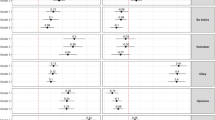Abstract
This study explored political fairness criteria in Japan: examining their commonality and stability. Respondents were divided into three groups according to their commitment to the incumbent Government, as measured by neutrality, trust, and respect. Regression analyses revealed that Procedural Fairness was the commonly used criterion in judging the total fairness of the consumption tax. Citizens' commitment affected fairness criteria and their relative weights. Another regression analysis was performed to examine the meaning of procedural fairness. A comparison with our previous study (Takenishi and Takenishi, 1990) indicated that the procedural fairness criteria remained stable: however, “voice” became a criterion because of the Government's campaign. Results suggested than democratic ethicality, which consists of social values and beliefs, was important.
Similar content being viewed by others
References
Barrett-Howard, E., and Tyler, T. R. (1986). Procedural justice as a criterion in allocation decisions.J. Pers. Soc. Psychol. 50: 296–304.
Greenberg, J. (1986). Determinants of Perceived Fairness of Performance Evaluations.J. Appl. Psychol. 71: 340–342.
Leventhal, G. S. (1980). What should be done with equity theory?: New approaches to the study of fairness in social relationships. In Gergen, K., Greenberg, M., and Willis, R. (eds.),Social Exchange: Advances in Theory and Research, Plenum Press, New York, pp. 27–55.
Lind, E. A., Lissak, R. I., and Conlon, D. E. (1983). Decision control and process control effects on procedural fairness judgments.J. Appl. Soc. Psychol. 13: 338–350.
Lind, E. A., and Tyler, T. R. (1988).The Social Psychology of Procedural Justice, Plenum Press, New York.
Sheppard, B. H., and Lewicki, R. J. (1987). Toward general principles of managerial fairness.Soc. Justice Res. 1: 161–176.
Takenishi, M., and Takenishi, A. (1990). Why Japanese citizens evaluate the new indirect tax as unfair: Fairness criteria and their relative importance.Soc. Justice Res. 4: 251–264.
Thibaut, J., and Walker, L. (1975).Procedural Justice: A Psychological Analysis, Erlbaum, Hillsdale, NJ.
Tyler, T. R. (1987). Conditions leading to value expressive effects in judgments of procedural justice: A test of four models.J. Pers. Soc. Psychol. 52: 333–344.
Tyler, T. R. (1988). What is procedural justice?: Criteria used by citizens to assess the fairness of legal procedures.Law Soc. Rev. 22: 103–135.
Tyler, T. R. (1989). The psychology of procedural justice: A test of the group-value model.J. Pers. Soc. Psychol. 57: 830–838.
Tyler, T. R. (1990).Why people obey the law. Yale University Press, New Haven, CT.
Tyler, T. R., and Lind, E. A. (1990). Intrinsic versus community-based justice models: When does group membership matter?J. Soc. Issues 46: 83–94.
Tyler, T. R., Rasinski, K. A., and Spodick, N. (1985). The influence of voice on satisfaction with leaders: Exploring the meaning of process control.J. Pers. Soc. Psychol. 48: 72–81.
Author information
Authors and Affiliations
Additional information
Each author contributed equally.
Rights and permissions
About this article
Cite this article
Takenishi, A., Takenishi, M. Does commitment affect the meaning of fairness?: Commonality and stability of fairness criteria in a political setting. Soc Just Res 5, 415–429 (1992). https://doi.org/10.1007/BF01050757
Issue Date:
DOI: https://doi.org/10.1007/BF01050757




